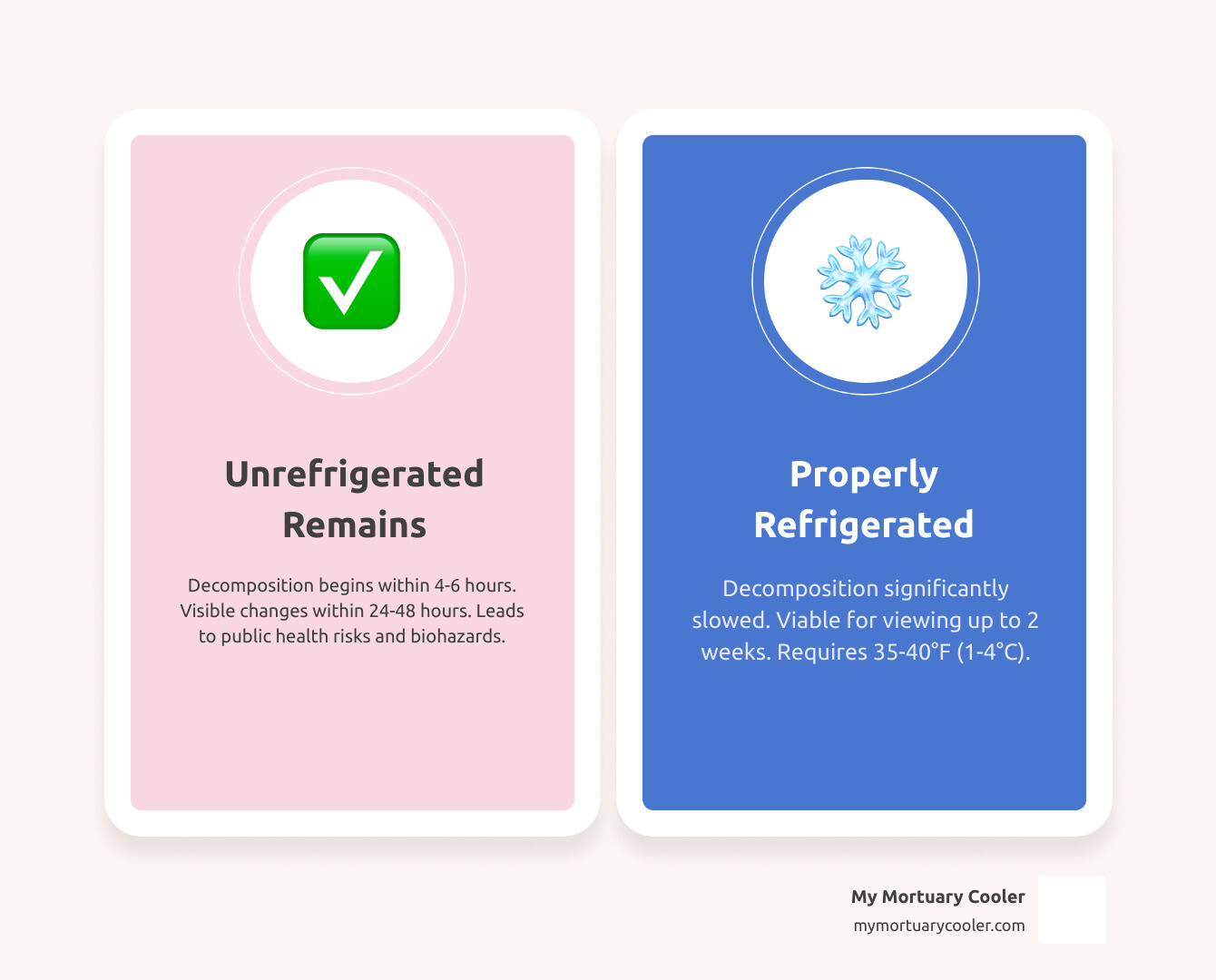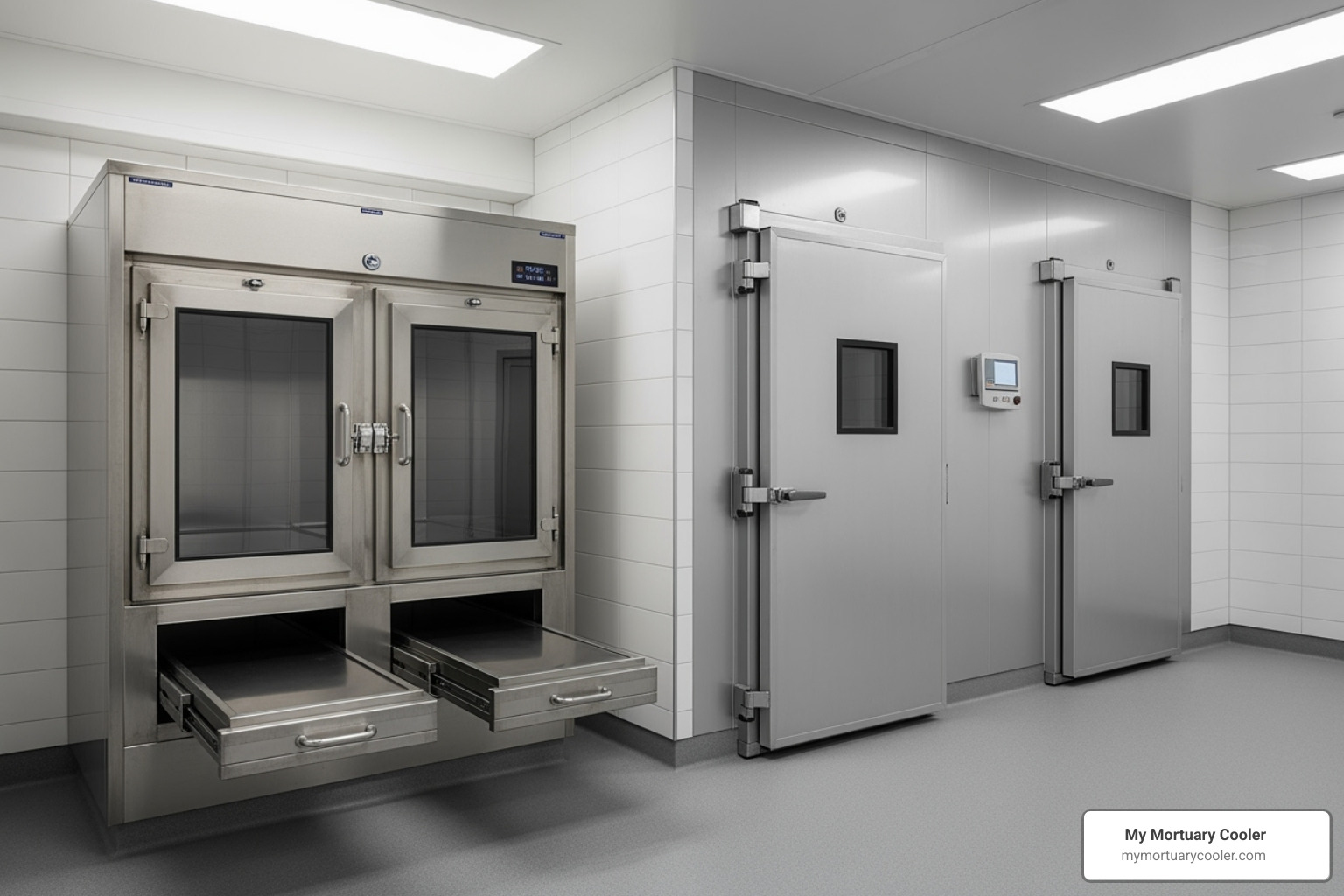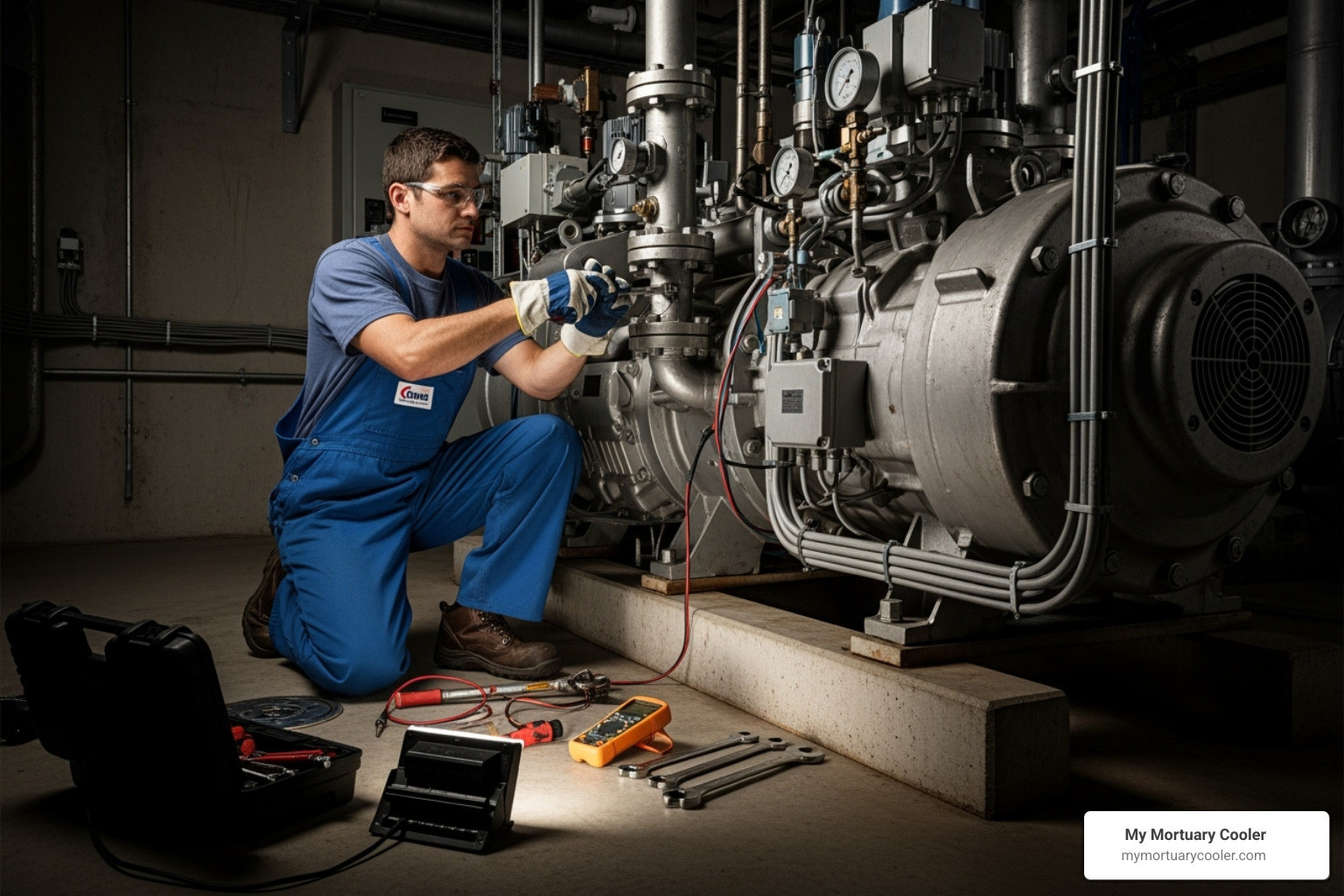Why Proper Body Storage Matters More Than Ever
Funeral home body storage is a critical responsibility that directly impacts public health, family dignity, and legal compliance. With nearly 200 decomposing bodies finded at a Colorado funeral home highlighting industry failures, proper storage has never been more important.
Quick Reference: Essential Body Storage Requirements
- Legal timeframe: Bodies must be refrigerated or embalmed within 24-72 hours in most states
- Refrigeration temperature: 35-40°F (1-4°C) for short-term storage
- Freezer temperature: 0 to -10°F (-18 to -23°C) for long-term storage
- Maximum storage: Up to 2 weeks with refrigeration, 3-4 weeks with embalming
- Documentation required: Temperature logs, chain of custody records
The science is clear: decomposition begins within hours of death without proper preservation. In Colorado, Pennsylvania, and New Jersey, state law requires refrigeration or embalming within 24 hours if burial or cremation is delayed. Failure to comply can result in severe consequences - from health violations to criminal charges.
The stakes couldn't be higher. Improper storage leads to accelerated decomposition, biohazards, and devastating emotional trauma for families. As one industry expert noted after the Colorado incident: "The conditions were so severe that identification required DNA testing, which could take months."
This comprehensive guide covers everything you need to know about funeral home body storage - from legal requirements and health risks to choosing the right refrigeration equipment for your facility. Whether you're planning a new facility or upgrading existing equipment, understanding these fundamentals protects both your operation and the families you serve.

The Critical Importance of Proper Body Storage: Legal and Ethical Mandates
When death occurs, time becomes critical. The natural decomposition process begins within hours, making proper funeral home body storage one of the most important responsibilities in our industry. Without immediate refrigeration or embalming, families face heartbreak, funeral homes risk serious legal consequences, and public health can be compromised.
The reality is sobering: decomposition doesn't wait. It creates biohazards, attracts insects, and can make viewing impossible for grieving families. For funeral professionals, improper storage threatens everything - from operating licenses to professional reputation. Most importantly, it violates the sacred trust families place in us during their darkest hours.

Legal Requirements and Timeframes for Body Preservation
Every state has rules about how long you can wait before preserving human remains, but the specifics vary widely. The 24-hour rule appears in many jurisdictions, though some allow up to 72 hours depending on circumstances.
Here's what the law requires in key states:
Colorado mandates preservation within 24 hours if final disposition is delayed. Bodies must be embalmed or placed in regulated temperature-controlled storage using refrigeration or dry ice.
Pennsylvania law follows similar guidelines, requiring embalming or refrigeration within 24 hours when burial or cremation won't occur immediately. The state doesn't specify maximum storage time but emphasizes "reasonable" periods for making arrangements.
New Jersey mirrors Pennsylvania's approach with the same 24-hour preservation requirement. Like many states, they focus more on proper initial preservation than setting strict storage limits.
The key is proper documentation. Temperature logs showing consistent 35-40°F storage, chain of custody records, and compliance paperwork aren't just good practice - they're legal necessities. Understanding California's specific regulations shows how detailed these requirements can be.
Embalming requirements vary too. Some states allow refrigeration as an alternative to embalming for extended periods, while others require embalming after a certain timeframe. The common thread is maintaining proper refrigeration temperatures between 35-40°F when embalming isn't performed immediately.
The Grave Consequences of Improper Funeral Home Body Storage
The Colorado funeral home scandal shocked the nation for good reason. Nearly 200 decomposing bodies were finded in horrific conditions - decomposition fluids pooling on floors, swarms of insects, and an overwhelming stench of death. Families who thought they had received their loved ones' ashes instead got random remains or nothing at all.
This wasn't just neglect - it was a complete breakdown of professional responsibility. The disturbing details of improper storage reveal how quickly things can spiral when proper funeral home body storage protocols fail.
Health risks multiply rapidly without proper refrigeration. Decomposition creates biohazards that threaten staff and public safety. Bacterial growth accelerates, creating infectious disease risks. Insect infestation follows, with flies and other pests spreading contamination throughout facilities.
The legal penalties are severe. Colorado's case resulted in criminal charges for corpse abuse and falsifying death certificates. Funeral homes face lawsuits from devastated families, massive fines from health departments, and loss of operating licenses. Professional reputations built over decades can vanish overnight.
But the worst consequence is emotional distress for families. Imagine learning your loved one's "cremated remains" were fake, or that their body decomposed beyond recognition due to negligence. A cruise ship incident involving a man stored in a drink cooler for a week shows how improper storage traumatizes families even in temporary situations.
Understanding The Five Stages of Body Decomposition Explained makes clear why proper storage isn't optional - it's essential for dignity, health, and legal compliance.
Ethical Considerations in Storing Human Remains
Proper funeral home body storage goes beyond legal compliance - it's about honoring the dignity of the deceased and supporting grieving families with complete transparency.
Every family deserves honest communication about storage methods and timelines. When we store remains in professional-grade refrigeration at proper temperatures, we're showing respect for families who trust us with their most precious loss. This means explaining our processes, maintaining detailed records, and never cutting corners.
Unclaimed bodies present special ethical challenges. In Ontario, unclaimed remains increased from 438 cases in 2019 to 1,183 recently. These individuals - often without family or financial resources - still deserve dignified care. Coroners and social services work extensively to locate relatives, but when unsuccessful, communities step up to ensure proper disposition.
Long-term storage ethics become complex when families face disputes, financial hardship, or legal investigations. Medical examiner holds for forensic cases can extend storage for months. International repatriation delays create additional challenges. Throughout these situations, maintaining proper refrigeration and treating remains with dignity remains paramount.
Transparency builds trust during difficult times. Families need to understand storage options, associated costs, and timeframes. Whether discussing standard refrigeration or explaining why freezer storage might be necessary for extended periods, clear communication shows respect for their decision-making process.
The ethical foundation of our profession rests on treating every person - claimed or unclaimed, wealthy or poor - with equal dignity and proper care.
A Comprehensive Guide to Funeral Home Body Storage Solutions
Finding the right funeral home body storage solution isn't just about buying equipment—it's about protecting families during their most vulnerable moments and ensuring your facility operates smoothly under any circumstances. Whether you're handling daily operations or preparing for unexpected situations, the right storage approach makes all the difference.
Every funeral home faces unique challenges. A small family-owned facility might need compact, efficient solutions, while larger operations require systems that can handle significant volume. Then there are special considerations: bariatric remains that need extra space, OSHA compliance requirements that can't be overlooked, and the unpredictable nature of death itself that demands flexibility.
The good news? Modern storage solutions have evolved to meet these diverse needs with remarkable efficiency and reliability.

Refrigerated Storage: The Industry Standard
When most people think of funeral home body storage, they're picturing refrigeration—and for good reason. These workhorses of the industry maintain that crucial 35-40°F temperature range that slows decomposition while preserving dignity and allowing families time to make arrangements.
Walk-in coolers represent the gold standard for many facilities. These spacious units offer the flexibility to accommodate multiple bodies while providing easy access for staff. Their modular design means you can expand capacity as your business grows, and the generous interior space makes handling remains safer and more respectful. The Ultimate Guide to Mortuary Coolers walks through everything you need to know about these essential units.
For facilities with space constraints or lower volume, reach-in coolers provide the same reliable preservation in a more compact footprint. These units excel at maximizing efficiency without compromising on quality—perfect for smaller operations or as backup storage for larger facilities.
Body boxes offer another approach entirely, providing individual or small-group storage with contained refrigeration. These units work particularly well for specific cases or facilities that prefer compartmentalized storage systems.
The heart of any refrigerated system lies in its body racking systems. These aren't just shelves—they're precision-engineered solutions crafted from stainless steel for maximum durability and hygiene. Proper racking ensures optimal airflow around each body, maintaining consistent temperatures while making staff handling safer and more ergonomic.
Want to dive deeper? Our guides on An Essential Guide to Funeral Home Refrigeration Units and Refrigeration Revelation: Walk-In Body Refrigerators Reviewed provide comprehensive insights into choosing the right refrigeration solution.
Long-Term Storage with Mortuary Freezers
Sometimes refrigeration isn't enough. When cases stretch beyond typical timeframes, mortuary freezers become essential. Operating at 0 to -10°F, these specialized units essentially pause decomposition, maintaining remains in pristine condition for extended periods.
Forensic cases often require this level of preservation. When investigations stretch on for months, or when legal proceedings demand that remains stay available for examination, freezing becomes the only viable option. The same applies to delayed burials caused by complex family situations, international repatriation challenges, or financial difficulties.
Anatomical donation represents another crucial application. Bodies destined for medical education or research may need to wait months before being used, making long-term freezer storage indispensable.
Freezers complement rather than replace refrigerated storage. They serve distinct purposes for specific situations where extended preservation becomes necessary. The ultra-low temperatures prevent cellular breakdown entirely, maintaining tissue integrity far longer than refrigeration alone could achieve.
Our comprehensive resources include Mortuary Freezer, Cold Storage Solutions: Top Morgue Freezers Available Today, and Everything You Need to Know About Funeral Home Body Freezers to help you steer these specialized systems.
Scalable and Temporary Body Storage Solutions
The funeral industry has learned hard lessons about being prepared for the unexpected. Whether it's a local tragedy, natural disaster, or simply an unusually busy period, having scalable storage solutions can mean the difference between maintaining dignified service and facing crisis.
Modular mortuary coolers provide the perfect answer to fluctuating capacity needs. These systems deliver the same reliable refrigeration as permanent installations but with the flexibility to expand or contract based on immediate requirements. When your facility faces temporary overflow, these units can be deployed quickly without major infrastructure changes.
Quick deploy mortuary coolers take emergency preparedness even further. Engineered for rapid setup in diverse environments, these solutions become lifelines during mass fatality events or disaster response situations. They can be transported and made operational swiftly, providing essential capacity when communities need it most.
These temporary solutions ensure that even under extraordinary circumstances, proper funeral home body storage standards are maintained. They relieve pressure on overwhelmed facilities while supporting broader emergency response efforts.
For detailed information on these critical systems, explore our guides on Quick Deploy Morgue and Mobile Morgues. These resources provide extensive information on selecting and implementing temporary storage solutions that maintain dignity while meeting urgent capacity needs.
Key Factors in Choosing and Managing Mortuary Storage
When it comes to funeral home body storage, making the right equipment choices requires careful planning and consideration. It's not just about buying a refrigerator - you're investing in the dignity of care, your facility's reputation, and long-term operational success. Smart planning involves thinking about your budget, available space, energy costs, maintenance needs, and how your facility might grow in the future.

Understanding the Costs of Body Storage Equipment
The true cost of funeral home body storage equipment extends far beyond that initial price tag. While it's tempting to focus only on upfront costs, experienced funeral directors know that taking a broader financial view leads to better decisions and fewer surprises down the road.
Initial purchase prices vary dramatically based on your needs. A portable mortuary storage rack might cost around $999.95, while specialized equipment like a battery-powered stainless steel scissor lift runs about $14,995.00, and a hydraulic scissor lift costs approximately $4,195.00. Walk-in coolers represent a larger investment, but they're often the backbone of efficient operations.
Installation costs can catch many facilities off guard, especially for walk-in units. Site preparation, electrical work, and professional assembly add up quickly. Our detailed Walk-In Cooler Installation Cost guide helps you plan for these essential expenses.
Don't overlook operational costs - these units run 24/7, and electricity bills add up. Energy-efficient models might cost more initially, but they often pay for themselves through lower monthly utility bills. Maintenance and repair costs are equally important to consider. Regular servicing keeps your equipment running smoothly, while unexpected breakdowns can be both costly and disruptive to your operations.
We understand these investments represent significant financial commitments. That's why exploring financing options makes sense for many facilities. When you consider that traditional funeral services range from $5,000 to $25,000, and cremation services cost $2,000 to $5,000, reliable storage equipment becomes an essential foundation for delivering these services. Check out our guides on Affordable Mortuary Coolers and Commercial Walk-In Freezer Cost to help with your planning.
Technology and Innovation in Modern Funeral Home Body Storage
Today's funeral home body storage equipment would amaze funeral directors from just a decade ago. Modern refrigeration systems combine reliability with smart technology, creating solutions that provide peace of mind while reducing operational headaches.
Digital temperature monitoring has revolutionized how we maintain proper storage conditions. These systems track temperatures continuously and send remote alarms directly to your phone or email if anything goes wrong. No more middle-of-the-night surprises or worried weekends wondering if everything's running properly.
Energy-efficient compressors represent another major advancement. These newer systems use significantly less electricity while maintaining consistent temperatures. Over time, the energy savings can be substantial, especially with rising utility costs.
The refrigeration industry has also acceptd newer refrigerants like R-448A and R-449A. These next-generation options offer better performance while meeting stricter environmental regulations. Our guide on R-448A & R-449A: Next-Gen Refrigerants for Efficient Mortuary Coolers explains how these improvements benefit your facility.
Smart tracking systems are beginning to integrate with inventory management software, allowing precise tracking of remains throughout your facility. Ergonomic designs in body racking systems and lifts reduce physical strain on staff, improving both workplace safety and efficiency.
For critical applications, systems now offer 100% redundancy with automated emergency switchover. If a primary component fails, backup systems engage automatically while immediately notifying staff. Some facilities also integrate carbon filtration systems to manage odors effectively, creating a more pleasant working environment.
The future looks even more promising, with innovations like AI Mortuary Coolers 2025 on the horizon. Embracing these technologies doesn't just improve service quality - it ensures your facility can handle whatever challenges arise.
Factors Influencing Extended Storage Decisions
Most families complete arrangements within a few days, but sometimes circumstances require extended funeral home body storage. These situations often involve complex legal, family, or logistical challenges that are beyond anyone's control.
Family disputes over final arrangements can lead to court battles lasting months. When next-of-kin disagree about burial versus cremation, or where services should be held, legal resolution takes time. Legal investigations by coroners or medical examiners can also extend storage significantly. Complex forensic cases sometimes require extensive analysis before remains can be released.
Difficulty locating next-of-kin has become increasingly common. In Ontario alone, unclaimed bodies rose from 438 cases in 2019 to 1,183 last year. Finding distant relatives or tracking down family members can take weeks or months of dedicated searching.
Financial hardship affects many families, especially when death is unexpected. Some families need additional time to gather funds or arrange payment plans. International repatriation involves complex paperwork, permits, and logistics that can cause significant delays, sometimes lasting weeks.
Religious or cultural observances may also dictate specific timing requirements that extend beyond typical storage periods. Some traditions require waiting for certain dates or completing specific preparations before final disposition.
Understanding these factors helps you prepare appropriate solutions and communicate compassionately with families during difficult times. Whether through robust refrigerated units or mortuary freezers for longer-term needs, having the right equipment ensures you can provide dignified care regardless of circumstances.
Frequently Asked Questions about Funeral Home Body Storage
When families face the loss of a loved one, questions about funeral home body storage naturally arise. These concerns often come during an already difficult time, so we believe in providing clear, honest answers that bring peace of mind.
How long can a funeral home legally hold a body?
The answer isn't as straightforward as you might expect - it really depends on where you are and how the body is being preserved. Think of it this way: different states have different rules, just like they do for driving laws.
Without any preservation (no refrigeration or embalming), most states require burial or cremation within 24 to 72 hours. This makes sense when you understand that decomposition starts almost immediately after death.
With proper refrigeration at 35-40°F, bodies can typically be held for up to two weeks. Our refrigeration units maintain these exact temperatures to slow decomposition significantly while keeping families within legal timeframes.
With embalming, the timeline extends to three to four weeks, sometimes longer with proper ongoing care. The embalming process chemically preserves tissues, buying families more time for arrangements.
Here's what's really important: funeral homes must always get proper consent from the next of kin for any preservation method. We also need to communicate clearly about final disposition deadlines. These regulations exist to protect public health and ensure dignity for the deceased - there's no room for shortcuts.
What is the difference between a mortuary cooler and a freezer?
This is one of the most common questions we hear, and it's a great one. While both are essential for funeral home body storage, they're designed for completely different situations.
Mortuary coolers operate between 35-40°F, which is similar to a regular refrigerator but specifically designed for preserving human remains. These units are perfect for short-term storage - usually days or up to two weeks. They slow decomposition without freezing tissues, which keeps the body suitable for viewing and standard funeral preparations.
Mortuary freezers work at much colder temperatures, typically 0 to -10°F or even colder. These units essentially halt decomposition by freezing the body completely. They're designed for long-term preservation when circumstances require extended storage.
Think of it this way: coolers are for the usual funeral timeline, while freezers are for special situations like forensic cases, lengthy legal investigations, or when families need months to arrange international transport. You wouldn't use a freezer for a standard three-day funeral preparation, just like you wouldn't use a cooler if you need to preserve remains for several months.
Our guide on Morgue Cooler vs. Regular Cooler: Why the Difference Matters explains these distinctions in even more detail.
What happens if a body is not refrigerated or embalmed promptly?
This is perhaps the most important question because the consequences affect everyone involved - from families to funeral home staff to the broader community.
Decomposition begins immediately after death, but it accelerates rapidly without proper preservation. Within the first 24-48 hours, you'll see visible changes like skin discoloration - often a greenish tint that becomes more pronounced over time.
Strong odors develop quickly as bacteria break down tissues and release gases. These aren't just unpleasant - they can be overwhelming and make the funeral home environment unbearable for both staff and families.
Bloating occurs as decomposition gases build up inside the body. This physical change can be shocking for families who weren't expecting it.
Public health risks emerge because decomposing remains attract insects and can harbor harmful bacteria. This creates a biohazard situation that puts everyone at risk.
Perhaps most heartbreaking, viewing becomes impossible. Families lose the opportunity to say their final goodbyes in a dignified setting, which can complicate the grieving process significantly.
The Colorado funeral home case we mentioned earlier shows exactly what happens when proper funeral home body storage protocols aren't followed. Nearly 200 bodies were found in various stages of decomposition, with conditions so severe that DNA testing was required for identification. The emotional trauma for families was immeasurable.
This is why prompt refrigeration or embalming isn't just a legal requirement - it's a fundamental responsibility we have to the families we serve and our communities.
Conclusion: Ensuring Dignity and Compliance with the Right Equipment
The responsibility of funeral home body storage goes far beyond keeping bodies cold. It's about protecting families during their most vulnerable moments, safeguarding public health, and upholding the sacred trust placed in funeral professionals every single day.
Throughout this guide, we've seen how proper storage makes the difference between dignity and devastation. The Colorado funeral home tragedy - with nearly 200 bodies found decomposing - serves as a stark reminder of what happens when this responsibility is taken lightly. Families who thought they had their loved ones' ashes finded they had been deceived, facing unimaginable heartbreak that could have been prevented.
The good news? You have proven solutions at your fingertips. Whether you need standard refrigerated coolers for daily operations, specialized freezers for long-term forensic cases, or quick-deploy systems for emergency situations, the right equipment exists to meet every challenge. These aren't just machines - they're your partners in providing compassionate care.
The legal requirements are clear: most states demand refrigeration or embalming within 24 hours. But compliance isn't just about avoiding penalties - it's about doing right by the families who trust you with their most precious memories. When a widow can have one final viewing with her husband, or when parents can say goodbye to a child with dignity intact, that's the real measure of success.
Modern technology makes this easier than ever. Digital monitoring systems alert you instantly if temperatures fluctuate. Energy-efficient compressors reduce operating costs while maintaining perfect conditions. Advanced refrigerants like R-448A and R-449A offer better performance and environmental compliance. These innovations aren't luxuries - they're essential tools for modern funeral service.
The investment in quality funeral home body storage equipment pays dividends in ways you might not expect. Fewer emergency repairs mean less stress and lower costs. Reliable temperature control protects your reputation and prevents devastating failures. OSHA-compliant systems keep your staff safe and your facility operating smoothly.
At MyMortuaryCooler.com, we understand that every funeral home's needs are different. That's why we offer everything from compact reach-in coolers for smaller operations to walk-in systems that can handle high volumes during difficult times. Our Equip Your Funeral Home Right: Top Picks for Mortuary Equipment guide helps you find exactly what your facility needs.
Your professional responsibility demands nothing less than excellence. The families you serve deserve equipment that works flawlessly, day after day. The communities you protect deserve systems that meet every health and safety standard. Most importantly, the deceased deserve the dignity that only proper preservation can provide.
Don't wait for a crisis to upgrade your storage systems. Invest in reliability, invest in compliance, and invest in the peace of mind that comes from knowing you're prepared for whatever comes through your doors.
















